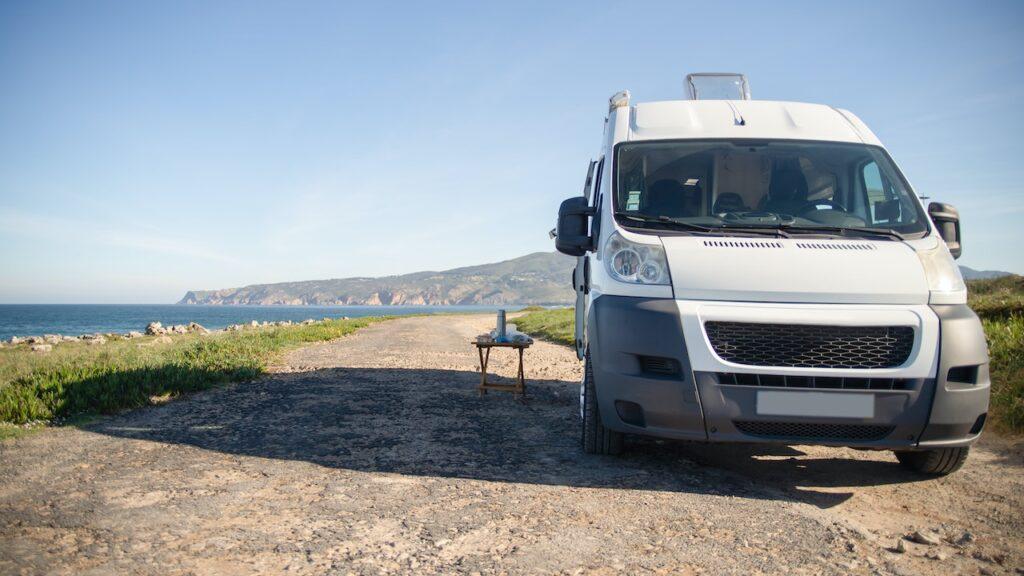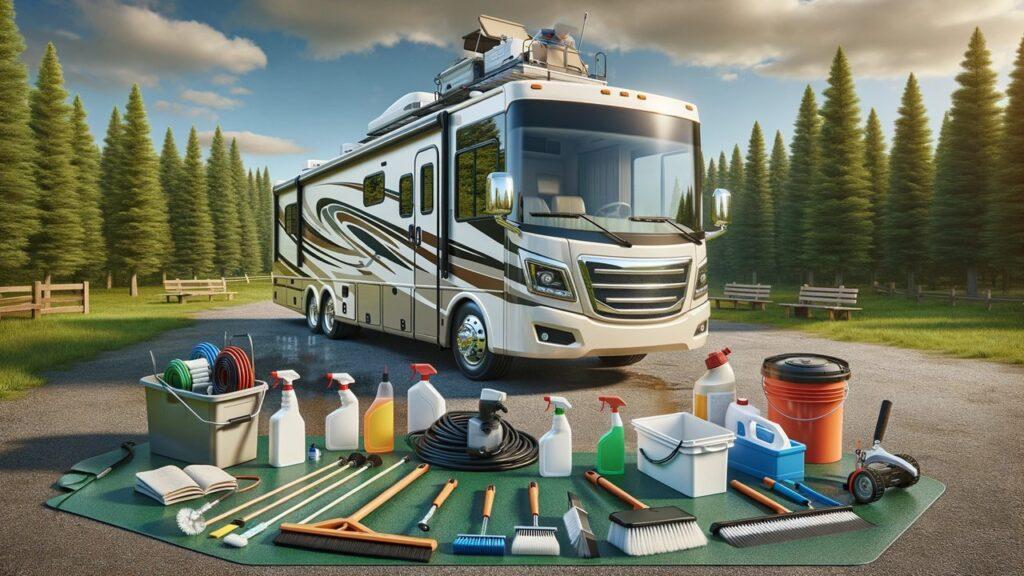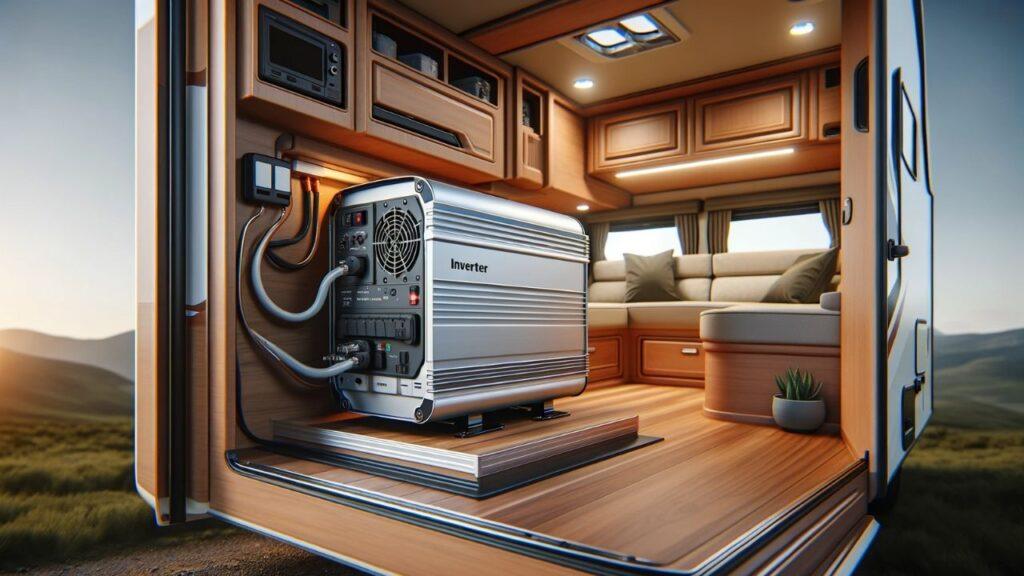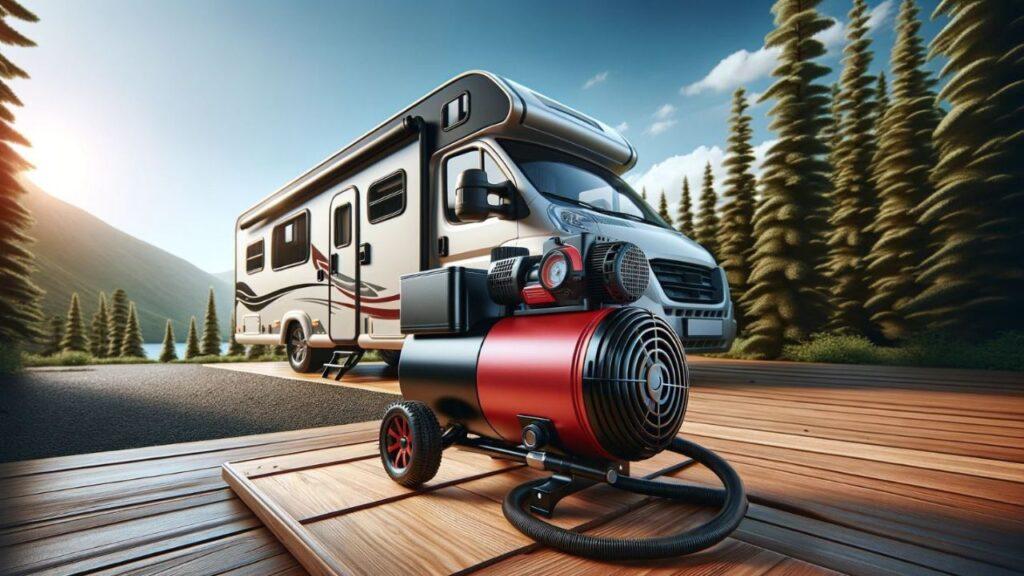
To choose the right generator for van life or RV living, focus on power needs, fuel type, noise level, and portability. A good generator should run your essentials, like lights, a fridge, or a fan, without being too loud or taking up too much space. Whether you’re off-grid or parked at a campground, the right one keeps things running smoothly.
This article breaks down the key things to look for when buying a generator. You’ll learn how to figure out how much power you need, which fuel works best for you, and what features make daily life easier on the road. Simple tips, no fluff.
The Evolution of Van Life
From its beginnings, van life was an embodiment of freedom, an escape from the mundane. Think of it: setting up your mobile office in nature’s lap, charting out your next road trip itinerary while parked beside a serene lake. Boondocking, or dry camping without utilities, was and remains a choice for many.
Fast forward to our connected era, where digital nomads merge work and travel. A modern campervan kitchen isn’t complete without a solar setup or portable Wi-Fi. Van insulation techniques have evolved to keep us comfortable in extreme climates, making tiny living not just feasible but enviable. The transformation from mere vehicle to a cozy, DIY camper build resonates with many seeking freedom.
Role of Power in Van Life
As enchanting as wild camping is, there’s a side of van life that demands attention: power. Being part of the van life community means sharing tips on the best campervan electrics like lights, air conditioners, heaters, discussing solar panels, or figuring out how to stay connected on the move. It’s not just about capturing those perfect sunset photos; it’s about making memories without compromising on modern comforts by powering that van life with electricity.
For those practicing freedom camping or overlanding across continents, the right power setup isn’t a luxury—it’s a necessity. Whether you’re deep into a project in your mobile office, cooking in your campervan kitchen, or just chilling with some music, the heartbeats of these moments are powered by the right generator.
Van life is a tapestry of experiences—from the joy of stealth camping in urban settings to the thrill of off-grid living in nature’s embrace. As we navigate through the world of van conversions, understanding our power needs is crucial. By doing so, we ensure our road trip itineraries remain uninterrupted, our mobile offices efficient, and our memories vivid. With the right knowledge, the open road truly becomes home.
Understanding the Fundamentals of Generators
Embarking on the van life journey opens a world brimming with uncharted roads, spontaneous wild camping nights, and unparalleled freedom. But to keep this world spinning smoothly, the power backing your mobile living space is paramount. From ensuring your campervan kitchen runs efficiently during your off-grid living adventures to setting up your mobile office in the midst of nature, generators stand as unsung heroes. But what makes them tick? Let’s delve in.
Basics of Generator Operation
Imagine you’re deep in the heart of nature, far from the grid. Your generator isn’t just another gadget; it’s the heartbeat of your camp. Turning on the lights, powering up the stove, or keeping your devices alive – it all hinges on understanding how your generator converts fuel to electricity. When planning your next stealth camping or settling at a boondocking spot, the voltage and wattage of your generator become crucial. The wattage tells you how robust your generator is, while voltage reveals the force driving this power. It’s not just about numbers; it’s about ensuring your lifestyle runs smoothly, no matter where you park.
Differentiating Between Different Vehicles
The van life community is a vast mosaic of vehicles, each with its quirks and strengths. There are campervans, handcrafted with DIY camper builds that resonate with the spirit of individuality. There are massive RVs that ooze luxury at every turn. Then you have the nifty minivans, perfect for those quick weekend getaways, and the sprawling motorhomes offering home-like comfort on wheels. Each vehicle sings its tune when it comes to power needs. Recognizing this can spell the difference between a trip that’s just good and one that’s truly memorable.
Power Terminology Unpacked
Navigating the world of van life without understanding terms like watts, volts, and amps is like setting off on a trip without a map. Watts give a glimpse of the power appetite of your gadgets, volts are the unseen force propelling the current, and amps? They’re the messengers, carrying this power from your generator to every nook and corner of your van. When you’re miles away from the nearest freedom camping spot, or setting up camp in a remote area, this trio ensures your van feels less like a vehicle and more like home.
The thrill of van life is undeniable, but it’s the understanding of its intricacies, from the heartbeat of generators to the varied needs of vehicles and the language of power, that turns the journey into an unforgettable experience. Knowing your tools and equipment is not just a technicality; it’s the bridge between mere travel and a truly liberated lifestyle.
Determining Your Vehicle’s Power Needs
Embarking on the open road and diving into the nomadic van life is nothing short of exhilarating. The charm of off-grid living is as much about spontaneity as it is about the little comforts that remind us of home. A well-powered campervan conversion, whether it’s bringing your coffee maker to life in the mornings or ensuring your RV is equipped for a TV show on a rainy evening, is at the heart of these comforts. Now, if you’ve wondered about the nitty-gritty, like how the heck does a campervan kitchen blender or your cozy van insulation heaters get the juice they need, you’re in the right spot. This guide is your trusty companion to understanding, assessing, and fulfilling those power needs, making sure the lights (and the fun) never go out.
Cataloging Essential Appliances
Picture this: you’re parked amidst the wild, the stars are out, and you’ve got a yearning for a warm meal. Your campervan kitchen is your knight in shining armor. But powering up that stove, warming those lights, and perhaps even putting on a bit of background music demands energy. Here’s your task – list down your appliances. From the must-haves like lights and fridges to those luxuries like blenders or espresso machines, they all have a power appetite. Knowing each device’s watt-hour (Wh) can be a game-changer. And remember, the balancing act is crucial. The goal is to keep the dance between consumption and power management so smooth that your energy source, be it a battery or a generator, hums along without any hiccups. It’s all about maintaining an efficient rhythm.
30-Amp vs. 50-Amp: What’s the Difference?
Alright, gearheads and newbies alike, let’s talk Amps. If RV lifestyle forums have you scratching your head about 30-Amp vs. 50-Amp, let’s break it down. Think of them as two distinct energy highways – one’s a bit more relaxed, and the other’s bustling. A 30-Amp system dishes out about 3,600 watts. In contrast, the 50-Amp, the high roller it is, doubles that power. It’s about knowing your party size. If it’s just you, a few devices, and the open road, the 30 might just be your jam. But for those looking for a bit more pizzazz and simultaneous appliance action, the 50’s got your back. And when pairing with generators, especially the RV-ready ones, ensure they’re singing the same tune for a smooth, safe, and efficient groove.
The van life is all about balance. Merging the allure of off-grid living with modern-day amenities requires a little bit of prep. Here’s your blueprint to ensuring your mobile abode, whether a campervan or an RV, never skips a beat.
Exploring Types of Generators
If there’s one thing synonymous with the van life adventure, it’s the undeniable importance of consistent power. As we navigate the winding roads of off-grid living and campervan conversions, the heart beating beneath it all is often a trusty generator. These little powerhouses ensure the coffee’s brewing, lights are glowing, and your campervan kitchen hums to life each day. The kind of generator you pick, its fuel source, and how it nestles into your mobile abode are pivotal decisions. Given the array of options, and the nuances that each presents, diving deep into the generator realm is our mission today. Ready to electrify your knowledge?
A Panorama of Generator Types
Navigating the terrain of generators can feel like stepping into a bustling marketplace, with stalls aplenty and choices at every turn. Furthermore, understanding the spectrum of generators is pivotal, especially when contextualizing choice based on your van lifestyle. Whether you’re a weekend wanderer or a full-time road ranger, different generators cater to varying needs. Some might be charming with their efficiency, while others boast eco-friendly credentials. Moreover, the generator type might just be the secret ingredient to amplifying your off-grid adventure.
Fuel For Thought: Understanding Power Sources
The lifeblood of any generator is its fuel. Let’s start with Gasoline. Celebrated for its longevity and efficiency, gasoline is a common choice. Yet, it’s essential to weigh the pros, like its widespread availability, against cons such as its flammability and short storage life. Then, there’s Diesel. Renowned for its efficiency, diesel generators often offer longer life spans. However, they can be bulkier and produce more emissions. Propane, on the other hand, waves the clean energy flag. With lesser emissions, it’s a greener choice but has storage considerations. Venturing into the realm of Solar, we find the eco-friendly champion. Though reliant on sunlight, solar generators are quiet, clean, and sustainable. Lastly, Natural Gas generators, while efficient, rely on a consistent gas supply, which may not always be feasible in remote terrains.
Technical Distinctions: Inverter Generators vs. Generators
Diving deeper into generator nuances, we unearth two distinct types: standard inverter vs. generators. A Standard Generator operates at a constant speed, producing a steady output. While they’re reliable, they might be noisier and less efficient. In contrast, Inverter Generators adjust their speed based on power needs. This adaptability means better efficiency, reduced noise, and improved power quality. So, if the hum of a generator isn’t your nighttime lullaby, inverters might just be your pick.
Spatial and Power Considerations: Portable vs. Built-In
Space, especially in a campervan, is premium real estate. Thus, understanding the spatial implications of Portable versus Built-In generators is crucial. Portable units offer flexibility and can be used across multiple settings, but they occupy precious interior space. Built-In solutions, meanwhile, are tailored to the vehicle, maximizing efficiency but potentially limiting versatility. Your choice here hinges on how you value mobility against the aesthetics and convenience of fixed solutions.
From understanding fuel sources like gasoline and solar to the technical intricacies of standard versus inverter generators, making an informed choice is pivotal. As you sculpt your van life experience, remember that the right generator can illuminate every twist and turn of your journey.
Sizing and Choosing Your Generator
Embarking on a journey, cradled in the comforts of your mobile haven, necessitates having an uninterrupted power source. Your generator isn’t just a machine; it’s one of the main power sources of your adventures. But here’s the puzzle: how do you ensure you select the right heartbeat for your vehicle, tailored to your unique needs? The matrix of generator sizing is no mere whim; it’s a critical calculation, blending both vehicle specifications and the energy needs of the tools and luxuries you carry.
Sizing by Vehicle and Need
When we speak of Campervans, we’re delving into compactness. These mobile spaces, though cozy, carry specific power prerequisites. Given their limited space, a balance between generator footprint and efficiency becomes paramount. On the opposite end of the spectrum lie the RVs. These vehicles are the epitome of luxurious mobile living. They house a plethora of devices, each hungry for energy, necessitating a generator with considerable capacity. Minivans represent a blend of simplicity and mobility. For such travelers, a lean yet effective power source is the golden mean. Lastly, Motorhomes stand as the titans of the road. Given their stature, their power demands are robust, urging for a generator that mirrors their grandeur.
Addressing Specific Power Hungry Devices
Beyond mere vehicle types, our focus must also encompass the particular devices we cherish. There’s no denying the undeniable appetite of certain gadgets and appliances. Air conditioning units and heaters, for instance, are notorious for their energy consumption. Equipping oneself with a generator that can effortlessly cater to these power-intensive devices is non-negotiable. Additionally, periods of simultaneous device usage — those peak power times — need specific attention. It’s imperative to have a generator that won’t falter when everything screams for energy.
Navigating the intricate landscape of generator sizing is akin to charting a course for a memorable journey. Whether you’re luxuriating in an expansive motorhome or cherishing the minimalistic embrace of a minivan, your generator stands as your unwavering ally. It’s not just about illuminating spaces; it’s about fueling experiences. And in this realm, precision in choice isn’t just recommended; it’s vital.
Real-World Generator Concerns
In the grand symphony of road trips, the generator hums its steady tune. It’s a travel essential, but, like every component of your journey, it comes with its set of realities. It’s not all about power output and type. The real-world issues – noise, weight, environmental impact – shape the true narrative of the generator experience. Let’s pull the curtain back and dive deep into these concerns, understanding them beyond the numbers and the specifications.
Noise: More Than Just An Annoyance
Imagine settling for the night in a picturesque camping site, only to have the serenity disrupted by a roaring generator. In shared spaces, such as campgrounds or rest areas, the audacity of a loud generator isn’t just bothersome; it’s socially irresponsible. It’s not only about comfort but also about mutual respect. Talking about numbers, decibel levels serve as a measure of this disturbance. But what does 70 dB or 80 dB mean in real terms? To paint a picture: a conversation at home stands around 50 dB, while city traffic can soar to 85 dB. Thus, a generator humming at 75 dB can be likened to the constant drone of traffic, hardly the backdrop for a tranquil night under the stars.
Weight and Portability: Lugging It Around
Weight isn’t just about the muscle needed to move the generator; it’s a conversation about the very heart of your trip – the vehicle. Heavy generators not only test your strength but can significantly affect your vehicle’s performance. This added weight influences fuel efficiency, urging you to make frequent stops at gas stations, and subtly draining your travel budget. Moreover, storage isn’t merely about finding space; it’s about balancing the vehicle, ensuring stability during those winding road journeys or bumpy terrains.
Being Eco-Conscious: Fuel Efficiency and Emissions
Today’s traveler is often an eco-warrior, conscious of their carbon footprint. Generators, depending on their type and fuel source, can either be allies or adversaries in this quest. While gasoline generators might offer convenience, they may not be the champions of green energy. Dive into the realm of sustainable alternatives, and solar generators make a compelling argument. Not only do they whisper rather than roar, but their emissions story is one of environmental respect. Exploring such alternatives isn’t a passing trend; it’s a statement of responsibility towards our planet.
The tale of generators isn’t just technical; it’s profoundly human and environmental. It’s about the peace we seek on journeys, the respect we owe to fellow travelers, the duty of stewardship towards our vehicles, and the pact we forge with Mother Earth. In selecting a generator, it’s this mosaic of concerns that truly drives the choice, urging us to think, feel, and then decide.
Maintenance, Longevity, and Troubleshooting
The dance of the open road, the allure of uncharted territories – these are the tales spun by travel enthusiasts. But underpinning these narratives is a symphony of machinery that often goes unnoticed until, of course, they hiccup. Generators, often unsung heroes of these adventures, require their own brand of TLC. Dive into the intricate world of maintenance and troubleshooting, for a generator’s longevity isn’t just about its build but how you tend to its nuances, rhythms, and occasional grievances.
Keeping Your Generator Humming
Ah, the reassuring purr of a well-tuned generator! But behind that seamless performance lies a regimen of routine checks and attentive care. Think of it as a health check-up: regular, meticulous, and proactive. Familiarize yourself with its quirks, the texture of its hum, the rhythm of its heartbeat. This intimacy aids in recognizing those subtle signs of wear and tear. Discoloration, unusual noises, or erratic performance? They’re the whispers of a machine seeking attention. Moreover, regular cleaning, filter replacements, and timely oil changes keep your travel buddy in prime condition, ready to power those dreamy adventures.
Addressing Common Generator Issues
Every machine has its days of rebellion, and generators are no exception. You might occasionally encounter hitches – perhaps it’s refusing to start, maybe it’s running rough, or perhaps it’s just plain noisy. Unearthing typical problems and their root causes can be a rewarding journey in itself. However, it’s crucial to understand the boundary between DIY fixes and situations that scream for professional help. While some issues like spark plug replacements or cleaning clogged filters can be managed with a handy toolkit and a bit of patience, deeper problems like electrical faults or persistent mechanical issues merit expert intervention. It’s about striking a balance between self-reliance and the wisdom of seeking expertise.
The essence of a harmonious journey is often echoed in the consistent hum of a reliable generator. By embracing regular maintenance, understanding its unique language of wear and tear, and addressing its concerns with knowledge and discernment, we ensure that our trusty generators stand by us, mile after memorable mile.
Alternative Power Solutions and Budget Considerations
When it comes to lighting up our nomadic lives on the road, isn’t it a bit overwhelming thinking about all the choices out there? From traditional, roaring generators to silent sun-soakers, the power game is ever-evolving. And, as if choosing the best source isn’t enough, there’s the small matter of our wallets and how much they’re willing to lighten. So, how do we get the best bang for our buck without skimping on quality? Let’s dive in.
Beyond Generators: Solar and Battery Solutions
Ever basked in the warm afternoon sun and thought, “If only I could bottle up this sunshine for later!” Well, with solar panels, in a way, you kind of can. These shiny, sleek marvels don’t just look cool on top of your rig; they quietly sip on sunlight, turning it into power for your nighttime reads or morning brews. But, what about those cloudy days or nighttime ventures? That’s where battery banks and their trusty sidekicks, the inverters, come in. Think of them as your power savings account, storing energy for a rainy day (quite literally). Inverters? They’re the magicians, converting raw energy into something your devices can safely consume.
Financial Considerations: Cost vs. Value
Alright, let’s talk dollars and cents. Everyone’s got a budget, whether it’s shoe-string or sky’s-the-limit. When staring down the price tags, it’s easy to get sticker shock. But remember, with quality gear like solar panels, you’re playing the long game. It’s not just about the upfront cost; think of the savings down the line with minimal maintenance and no fuel costs. Battery solutions, while needing a change now and then, offer unparalleled convenience. So, as you ponder and calculate, ask yourself: What’s the real value here? Is it worth the extra upfront cost for a smoother journey down the line?
Exploring the open road requires more than just a sense of adventure; it demands the right tools to keep the journey going. While solar panels offer a silent and sustainable energy solution, battery banks guarantee power even when the sun ducks behind the clouds. Yet, every choice boils down to a balance between cost and value. So, as you chart your course, factor in both the journey’s demands and your wallet’s whispers.
Wrapping Up!
Embarking on the van life journey means diving deep into the world of power solutions, and it’s not just about machines or specs. It’s about finding that sweet spot where your generator not only lights up your appliances but also fuels your sense of adventure. This bond between man, machine, and the open road is poetic in its essence. Yet, with ever-evolving technologies, what’s ideal today might be outdated tomorrow. Hence, staying informed is not just wise—it’s vital. Dive into the rich tapestry of van life communities, where seasoned travelers and eager newcomers exchange tales, tips, and sometimes, just some good old encouragement. Also more expert guides on generators and social forms would be very helpful to thoroughly understand for choosing a right generator. Remember, as you map out your journey, the real power doesn’t just come from a generator; it’s also in the stories you gather and the connections you forge along the way.
FAQs
What’s the primary factor when choosing a generator for van life?
Consider your power needs, including peak demand and daily consumption.
Should I go for gas, diesel, or solar generators?
Evaluate your travel frequency, eco-concerns, and budget; solar is eco-friendly, while gas and diesel offer more power.
How does generator noise impact van life?
Loud generators can disturb peace and breach campsite regulations; opt for quieter models or noise-reducing solutions.
Are built-in generators better than portable ones for vans?
Built-ins are convenient but fixed; portables offer flexibility in placement but need more setup time.
How often should I maintain my van’s generator?
Regularly check for wear and perform routine maintenance to ensure longevity and efficiency.

Ash is an author at OutdoorCarry. He specializes in writing articles realted to van and RVs as he is an outdoor and tech enthusiast and he loves driving and camping and enjoying open roads. Over the past eight years, Ash has been working independently and writing contents on RV and RV related items, and also contributing to some reputable blogs. His goal is to provide real value to his readers and share his experince and expertise.







